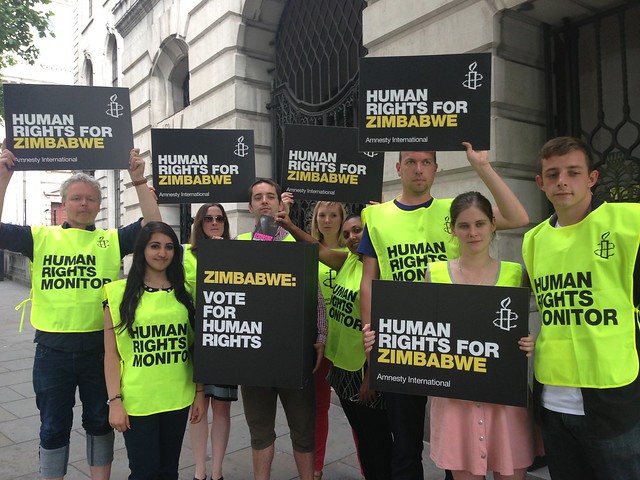18,000 voices call for violence free elections in Zimbabwe
Today, Amnesty colleagues and I will present 7,000 action cards to the South African High Commission and an 11,000 strong petition to the Tanzanian High Commission in London, calling for violence-free elections in Zimbabwe.
What have South Africa and Tanzania got to do with these elections?
Well, the answer is quite simple; they’re two countries which could play a crucial role in ensuring Zimbabwe’s elections are peaceful. Both countries hold key roles within the Southern African Development Community (SADC), a body of 15 countries, whose pressure on the Zimbabwe authorities over the next two weeks could be vital in preventing a repeat of the violence that has accompanied previous Zimbabwean elections.
Let me take you back. The last time Zimbabwe went to the polls in 2008, violence spread across the country after the first round of polling. Much of it was state-sponsored and resulted in more than 200 people killed, 10,000 injured and 28,000 forced to flee their homes. The violence was so widespread that the hospitals even ran out of crutches. Political activists and human rights defenders were often targeted, as were the young and old.
Our researcher described to me recently the horror and the sadness he felt after interviewing an 84 year old woman that year. She had been beaten so badly it resulted in a broken arm, leg and bruises all over her body. Her crime? All she did was not attend a rally organised by the ruling ZANU–PF party, let by President Mugabe. ‘In a society that is supposed to respect the elderly, that was just too much’ he told me.
But this is where SADC comes into play. You’ve been emailing and campaigning for SADC to take a strong stance now, to prevent violence, intimidation and harassment from marring this election.
Today we’ll take your messages to them - we'll update this blog today as we go!
Your message to South Africa: Vote for human rights

We’ve just handed in over 7,000 action cards sent in by you from around the UK. South Africa is a key influencer because it holds a formal mediating role, on behalf of SADC, between Zimbabwe’s main political parties. SADC’s intervention in 2008 helped to stem the violence and their influence that helped bring the main political parties together to form a ‘Government of National Unity’.
Although we hope it won’t get to that point, it could be South Africa’s intervention as a mediator that will be crucial again this year.
Tanzania: key to keeping peace in the region

Tanzania is the current chair of the SADC ‘Organ on Politics, Defence and Security’. In plain English, this is the SADC grouping responsible for peace and security within the region, and why they were the target of our 11,000-strong petition.
SADC is also one of the few international bodies which will have observers at the 31 July election. For Amnesty this means they have both the opportunity and a responsibility to record any human rights violations and abuses they observe and monitor human rights conditions beyond polling stations and their immediate vicinity, since often serious human rights abuses happen outside of these locations.
In other words: please act as human rights monitors as well as election observers.
Next steps for a violence- and intimidation free election
Your petition signatures and action cards are now with the Tanzanian and South African High Commissions, and we’re confident your voices have been heard. The key test now will be whether violence erupts during the elections, and the response of SADC.
We’ll be very closely monitoring the elections, especially the treatment of human rights activists. Hopefully we won’t need you, but be ready to take action if we do. Follow us on Twitter or Facebook to keep up-to-date with the campaign.
Follow @AmnestyUK !function(d,s,id){var js,fjs=d.getElementsByTagName(s)[0],p=/^http:/.test(d.location)?'http':'https';if(!d.getElementById(id)){js=d.createElement(s);js.id=id;js.src=p+'://platform.twitter.com/widgets.js';fjs.parentNode.insertBefore(js,fjs);}}(document, 'script', 'twitter-wjs');
(function(d, s, id) {
var js, fjs = d.getElementsByTagName(s)[0];
if (d.getElementById(id)) return;
js = d.createElement(s); js.id = id;
js.src = "//connect.facebook.net/en_GB/all.js#xfbml=1&appId=174469932626839";
fjs.parentNode.insertBefore(js, fjs);
}(document, 'script', 'facebook-jssdk'));
Our blogs are written by Amnesty International staff, volunteers and other interested individuals, to encourage debate around human rights issues. They do not necessarily represent the views of Amnesty International.
0 comments